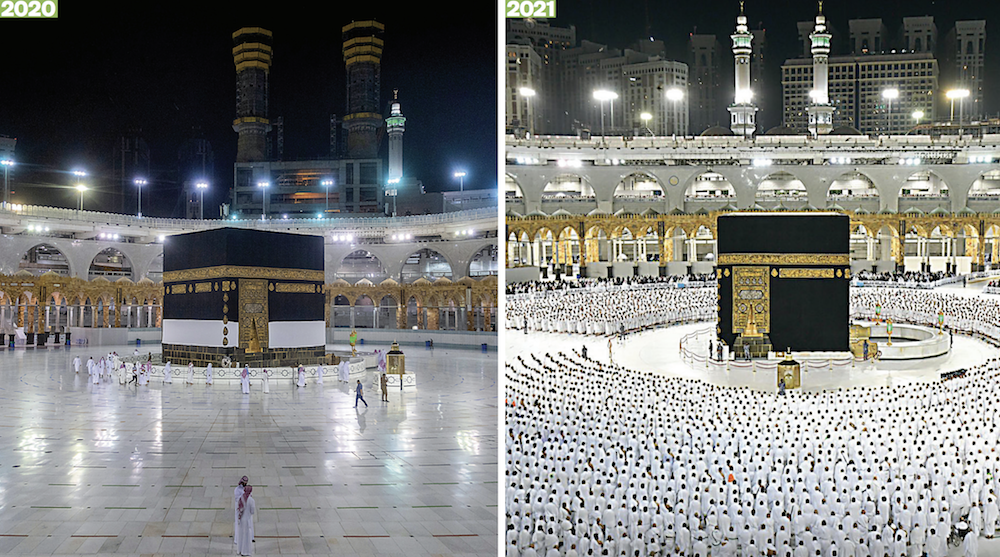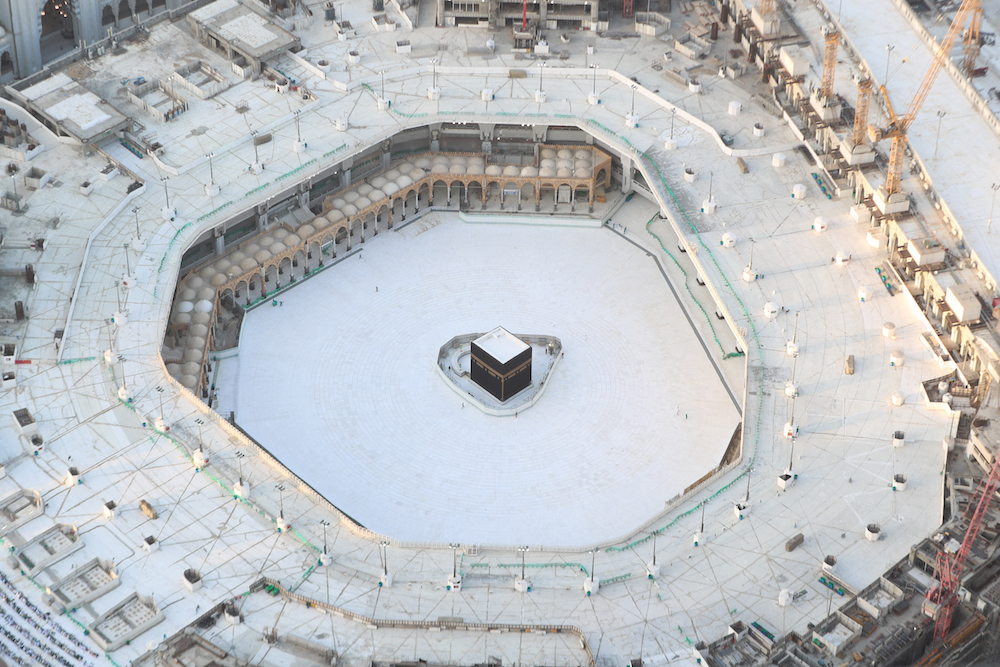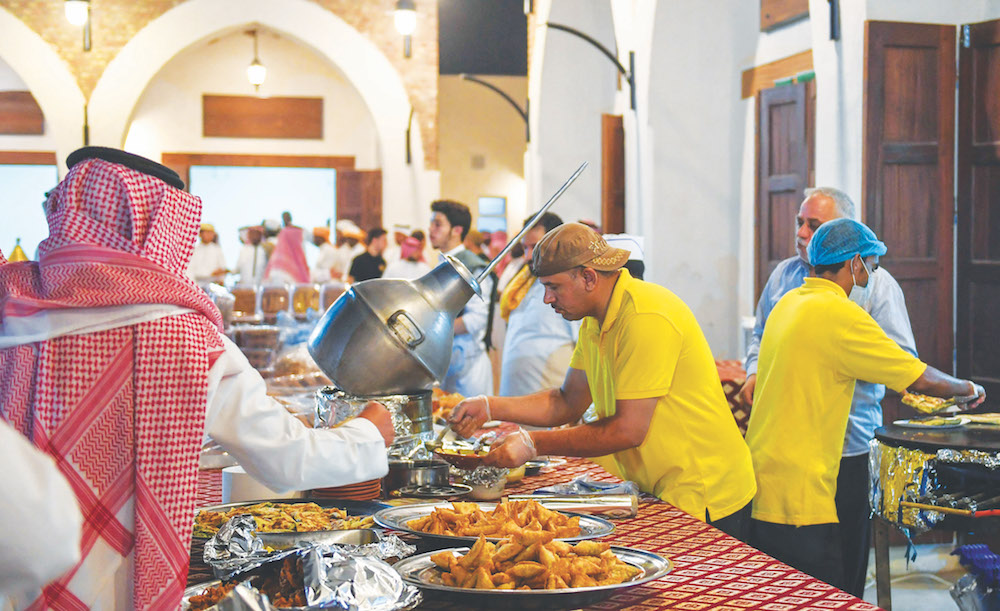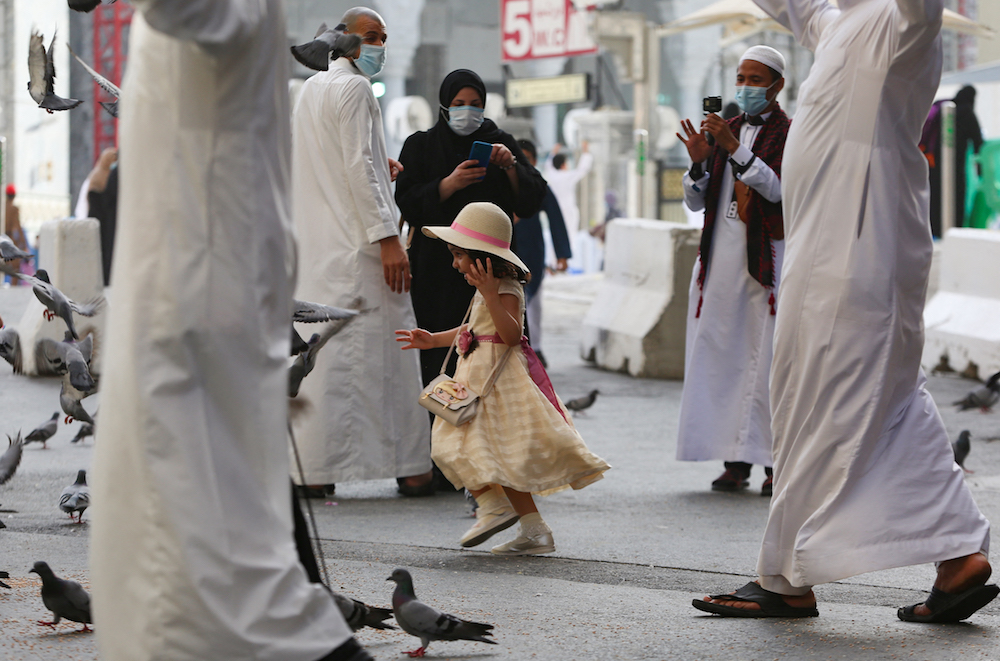JEDDAH: Two years ago, at the height of the early stages of the COVID-19 pandemic, Muslims around the world were forced to observe the holy month of Ramadan under lockdown.
They were deprived of the chance to spend time with their extended families and enjoy the tradition of breaking the fast together, to say nothing of the opportunity to make the pilgrimage to Makkah and Madinah.
Now, thanks to the protections offered by mass vaccinations, many precautions have been relaxed, including social-distancing rules, travel bans are being lifted, and a semblance of normality is beginning to return to daily life. As a result, many Muslims around the world will, for the first time since 2019, once again be free to observe Ramadan in the ways they are used to.
The Ramadan crescent moon was sighted in Saudi Arabia on Friday evening, which meant that the holy month officially began on Saturday, according to an official announcement from the Kingdom’s Supreme Court. Four other Arab Gulf countries, Bahrain, Kuwait, Qatar and the UAE, also announced the start of Ramadan on Saturday, while Oman said it is expected to begin a day later.
No one suspected on the final day of Ramadan in 2019, June 3, that the pilgrims who had gathered at the Grand Mosque in Makkah and the Prophet’s Mosque in Madinah to perform the Taraweeh prayers would be the last to do so during Ramadan for quite some time.

Muslims the world over will hope that the social restrictions caused by the coronavirus disease pandemic, which prevented so many from observing core tenets of their faith, will never be seen again within their lifetimes. (AFP)
Nine months later, on March 11, 2020, the World Health Organization declared that the novel coronavirus outbreak that initially emerged in the Chinese city of Wuhan had become a full-blown global pandemic. Governments worldwide soon began to respond by imposing stringent controls on freedom of movement and social interaction.
The Saudi Ministry of Health announced the first confirmed case of COVID-19 in the Kingdom on March 2 that year. The Saudi patient, who had traveled from Iran via Bahrain over the King Fahd Causeway, was immediately quarantined.
The ministry dispatched infection-control teams to trace and test anyone he had been in contact with. Two days later, a second Saudi tested positive for the virus and soon cases of COVID-19 began to increase rapidly across the Kingdom, as in many other countries.
On March 6, a photograph of the circular courtyard in Makkah’s Grand Mosque went viral on social media. Normally packed with worshipers clad in white robes circling the Kaaba, the dish, as the courtyard is also known, was empty, lifeless and still — completely deserted except for a few security guards.
The depressing image seemed to encapsulate the severity of the rapidly escalating health emergency.
“The sight of that empty courtyard was a reality check,” Sanaa Abdulhakeem, 72, a retired Saudi educator, told Arab News.

An eerie emptiness enveloped the sacred Kaaba at the Grand Mosque in Makkah in 2020, where attendance at Friday prayers was hit by measures to protect against the deadly coronavirus. (AFP/File Photo)
“Never in my life have I seen the mosque empty. I was born right across from the mosque in Makkah and have lived all my life near it. It’s a place that is always buzzing with life. A hush falls over it only when worshipers are praying in unison with the imam.”
Pandemic restrictions meant that Abdulhakeem and her relatives were forced to break with a cherished family tradition of welcoming and feeding visiting pilgrims. She is excited about resuming this charitable activity this year.
“Every year, my sons and grandsons head to the mosque’s outdoor courtyards to distribute hot meals, dates, water and laban,” she said. “We all pitch in together, and their father and I oversee the process of packaging.
“It is a family affair that we weren’t allowed to experience for two years and that was difficult. How can you cut a 35-year-old habit that grew into a family affair?”
INNUMBERS
* 750,589 COVID-19 infections in Saudi Arabia since the pandemic began
* 9,042 deaths related to the disease reported in the Kingdom
* 62m doses of COVID-19 vaccines administered in the country
Source: Reuters COVID-19 Tracker
On March 6 this year, Saudi authorities announced the lifting of most COVID-19 restrictions and that social distancing is no longer required in public places, including the Grand Mosque and Prophet’s Mosque.
The next day, hundreds of pilgrims gathered to perform early-morning prayers together at the Grand Mosque, standing shoulder to shoulder for the first time in many months.
“This is what we’ve been waiting for; we can go about our rituals and traditions this Ramadan and we hope this will be the last we hear of COVID-19,” said Abdulhakeem.
“In the grand scheme of things the timing couldn’t be better, with Ramadan right on our doorstep. I’m seeing my grandchildren for the first time in over two years. The house will be full again, with everyone under one roof on the first day of Ramadan. This could be the end of COVID as we know it.”
Saudi authorities also recently announced the lifting of a ban on flights to and from 17 countries previously deemed high-risk locations owing to domestic instability and high COVID-19 infection rates. In addition, travelers are no longer required to show proof of vaccination, to quarantine after arrival, or to take a PCR test before departure or arrival at any of the Kingdom’s entry points.

Saudis shopping for food as Muslims from all over the world prepare for the upcoming holy fasting month of Ramadan, at a market in Madinah. (AFP/File Photo)
As part of its efforts to control crowd sizes and ensure a trouble-free pilgrimage, the Saudi Ministry of Hajj and Umrah has said that Muslims who want to perform Umrah or pray in the Rawdah at the Prophet’s Mosque will still need to apply for permits through the Eatmarna or Tawakkalna apps. Face masks will continue to be mandatory.
For observant Muslims, Ramadan is a month of fasting and prayer but also an occasion for spending more time with extended family. Homes are often decorated with strings of twinkling fairy lights, doorways are adorned by lanterns, and bright red and blue oriental-themed banners hang across living room and dining room ceilings. Some families give their homes a complete Ramadan makeover, including traditional red, patterned fabrics, in preparation for guests.
“This year, Ramadan will be extra special as not only will my mother be visiting, but my uncles and cousins will also be arriving from Egypt to perform Umrah and stay at my place for a few days,” Najia Jamal, a 29-year-old Saudi-Egyptian mother of two who lives in Jeddah, told Arab News.
“My mother’s pulling the strings this year; the decorations were delivered early, with instructions. I bought all their favorite foods and prepared a broad menu filled with the most delicious Saudi dishes.
“The most unusual item I received from my mother’s care package is a traditional jar of foul (fava beans) bought specially from one of Cairo’s old neighborhoods where all sorts of Ramadan goods can be found.

With Ramadan now here, the Kingdom and its people can look forward to a holy month observed in the manner they cherish — surrounded by family and friends. (AFP/File Photo)
“It’s a celebration of its own sort. I don’t know of a single household that is not going all out with decorations and giving each other Ramadan gifts, such as lanterns or dates or decorating kits for children.
“The good news has made us forget that COVID-19 is still a threat. It’s become a minor concern now. It’s time to embrace the month without fear and share the love with family.”
Jamal’s aunt, Gawdat Hafez, a retired Saudia Airlines employee in Cairo, said she hopes to surprise her niece with a customized lantern from a famous seller in Cairo’s Sayyida Zainab neighborhood.
“It’ll be good to see my niece again and bring her a taste of home,” she told Arab News. “It’s the month of giving, unity and family bonding and a time to put the past two years behind us.”


































